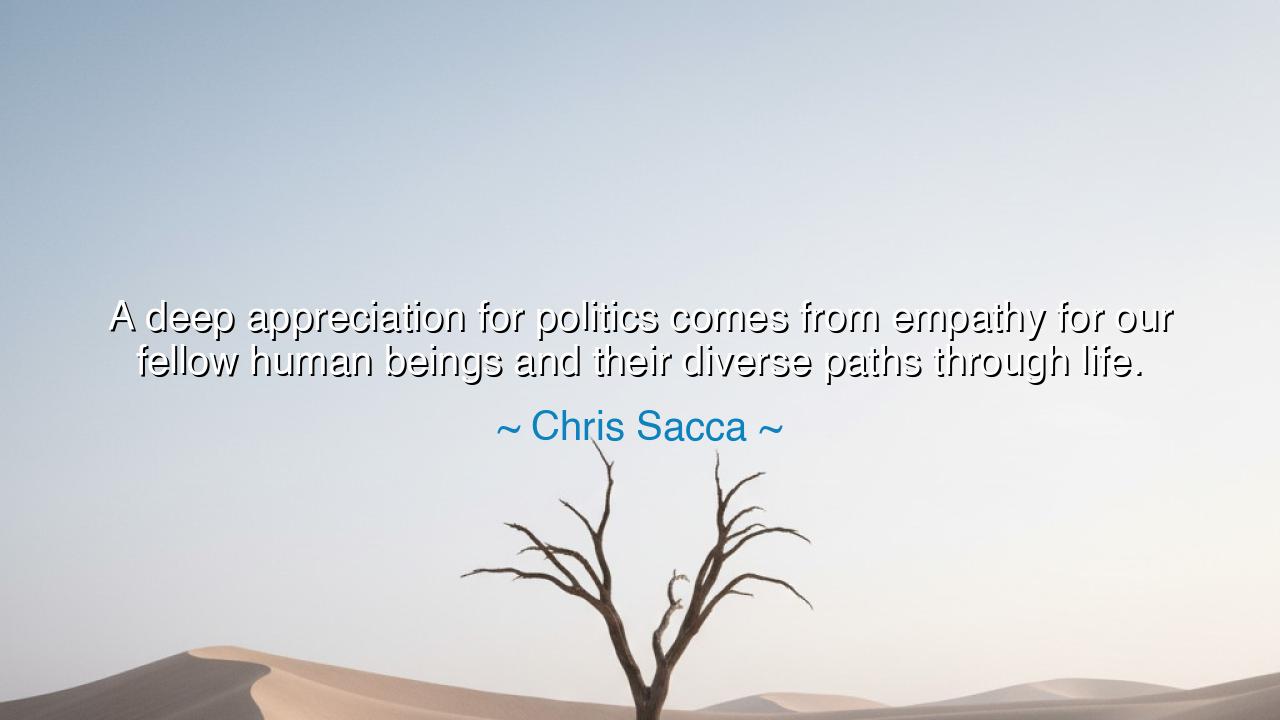
A deep appreciation for politics comes from empathy for our
A deep appreciation for politics comes from empathy for our fellow human beings and their diverse paths through life.






Politics, at its truest essence, is not a game of power nor a contest of egos—it is the art of guiding communities and shaping the shared destiny of humankind. When Chris Sacca declared, “A deep appreciation for politics comes from empathy for our fellow human beings and their diverse paths through life,” he spoke of the sacred root of all governance: empathy. Without understanding the struggles, hopes, and journeys of others, politics becomes hollow, serving only ambition and division. But when leaders and citizens alike cultivate empathy, politics becomes a tool of unity and progress.
At the heart of this wisdom lies the recognition that every person walks a different path. Each individual carries their own burdens, shaped by culture, history, and circumstance. To govern wisely, one must listen deeply, seeking to understand lives far different from one’s own. This is why Sacca ties politics to empathy: it is only through seeing the humanity of others that we can craft laws and policies that are just and compassionate. Without this vision, politics descends into cold machinery, blind to the very people it claims to serve.
History offers a shining example in the life of Abraham Lincoln. Though he led during one of the most divided times in American history, Lincoln’s politics were grounded in a profound empathy for both enslaved peoples and the Union soldiers fighting for freedom. His speeches, such as the Gettysburg Address, did not merely appeal to reason—they spoke to the shared suffering and hopes of a nation. It was this empathy that allowed him to guide the country through civil war and begin the long journey toward healing. His leadership reflects Sacca’s teaching: true politics arises from the heart, not just the mind.
Conversely, the absence of empathy in politics leads to ruin. The French Revolution, though born from cries for liberty, descended into terror when factions lost sight of their fellow citizens’ humanity. As leaders grew consumed by ideology and power, they ceased to listen to the diverse voices of the people. The result was chaos and bloodshed, a grim reminder that politics without empathy becomes tyranny disguised as righteousness.
Sacca’s words also call upon ordinary citizens, not just rulers. In a world of diverse beliefs and experiences, it is easy to retreat into echo chambers and see others as enemies. But to truly engage in politics is to open one’s heart and listen deeply, even to those with whom we disagree. It is to recognize that the purpose of politics is not to destroy opponents but to weave together the many threads of society into a shared future. Empathy transforms political debate from a battlefield into a bridge.
Let this teaching echo through the ages: politics is the mirror of our collective compassion. As Chris Sacca reminds us, the strength of a nation is not measured by its wealth or armies, but by its ability to honor the diverse journeys of its people. When empathy guides politics, justice flourishes, and communities thrive. Without it, even the greatest nations crumble. Seek first to understand, and in that understanding, build a world where every voice is heard and every path respected.






Nnguyenhoangnam
I agree with this quote, but I also wonder: is empathy alone enough to lead to real political change? Can politicians be empathetic and still make decisions that impact people negatively due to system constraints or political pressures? In an ideal world, politics would reflect empathy, but how do we create a political environment where understanding others’ paths is the foundation of all decisions?
C1Tieu chi 14
Chris Sacca's point about empathy in politics is important. It highlights that, at its core, politics should be about understanding and improving people's lives. But I wonder if it’s too idealistic to think that empathy can truly change the way politics works, especially with the influence of money and power. How can we shift from a politics of division to one that prioritizes understanding and compassion for everyone?
AAAnnh Anh
This quote makes me question the current state of politics. If deep appreciation comes from empathy, why does it feel like empathy is often lacking in political discussions today? It seems like too many politicians are more focused on power than on understanding the diverse struggles of their constituents. What can we do to ensure that empathy becomes central to political decision-making? Should it be a requirement for politicians to truly understand the lives of the people they serve?
TM22 thao minh
I love how Chris Sacca emphasizes empathy in politics. It makes me think about how often politicians seem distant from the everyday challenges people face. Is it possible that if more people, especially those in power, truly understood and empathized with others, we could create a more just society? But is empathy enough, or do we also need a system that actively supports this understanding with practical change?
DNLe Danh Nhan
This quote really resonates with me. It suggests that empathy, a deeper understanding of people's experiences, is key to appreciating politics. But does this mean that those who are disconnected from other people's struggles may not fully grasp the importance of political decisions? It feels like politics often gets reduced to cold, calculated decisions, but if more leaders approached it with empathy, would we see a shift in policies that better serve everyone?